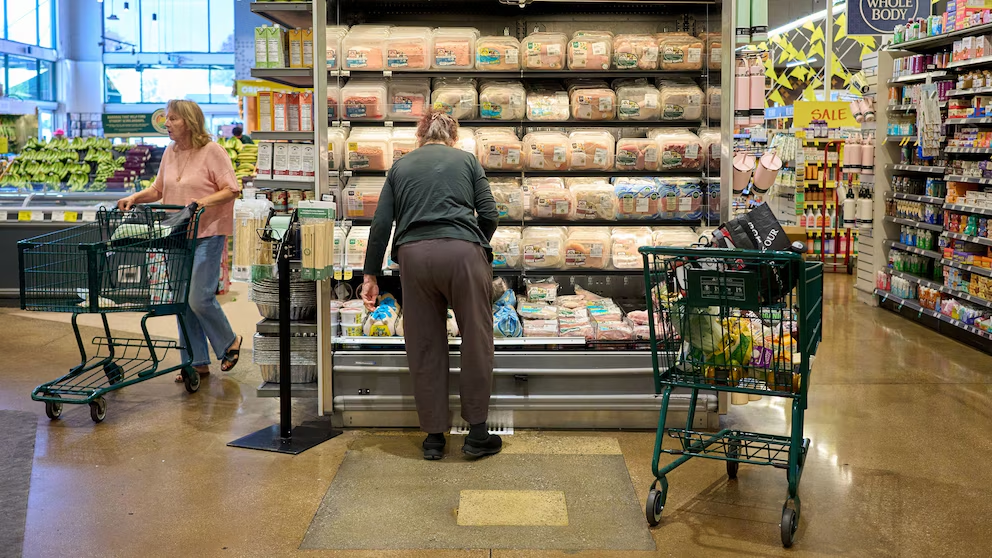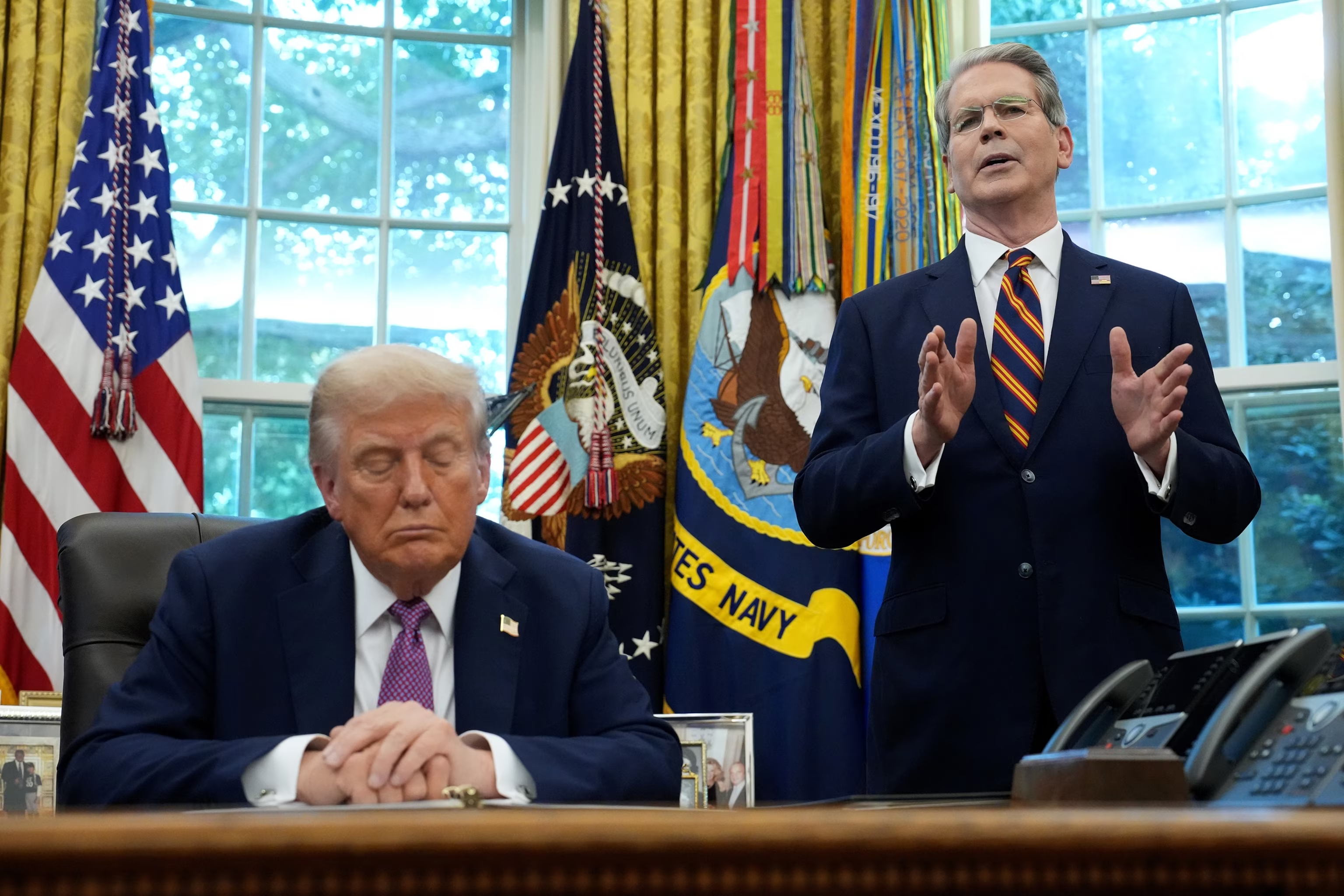“1:40am People buy groceries at a store in Los Angeles, Oct. 31, 2025. Allison Dinner/EPA via Shutterstock The Supreme Court is scheduled to hear oral arguments Wednesday in a case that will determine the fate of President Donald Trump’s highest tariffs, which affect the prices shoppers pay and interest rates set by the Federal Reserve, economists told ABC News. The highest court of the country […]”, — write: businessua.com.ua

1:40am People buy groceries at a store in Los Angeles on October 31, 2025. Allison Dinner/EPA via Shutterstock
The Supreme Court is scheduled to hear oral arguments Wednesday in a case that will determine the fate of President Donald Trump’s top tariffs, which affect the prices consumers pay and interest rates set by the Federal Reserve, economists told ABC News.
The country’s highest court will review the legality of the massive gatherings from dozens of countries announced during the garden ceremony of roses, which Trump called “Liberation Day”. The case also involves tariffs imposed on China, Mexico and Canada, as well as a basic 10% levy imposed on nearly all imports.
The ruling could affect tens of billions in tax revenue and change trade deals with some of the US’s biggest trading partners, including the United Kingdom and China.
Some economists who spoke to ABC News said the case could change the costs borne by U.S. households and the hiring decisions companies make, though the effect may be limited as the Trump administration is likely to seek to reimpose the tariffs under other laws.
Still, economists added, the court’s ruling could have a serious impact on the U.S. economy for years to come, as a unilateral executive branch imposing tariffs would create new leverage for policies like taxation and trade, which are at the heart of economic governance.
Trump has repeatedly defended his legal authority to impose tariffs and warned of economic damage if they are struck down.
“If we don’t win this case, we’re going to be a weakened, troubled financial mess for many, many years,” Trump said at a White House event last month. “And if we do that, we will become the most powerful economic country in the world.”
Trump has raised the tariffs in recent months, in part through authority under the International Emergency Economic Powers Act, the legal authority in question. before the Supreme Court.
Last week, the Yale Budget Lab found that the overall average effective rate was 17.9%, the highest since 1934. Prices are expected to rise gradually this year as a result of the levy, which means a loss of about $1,800 for the average household, the group said.
“Higher tariffs raise the prices of some categories of goods, which leads to higher overall inflation,” Federal Reserve Chairman Jerome Powell said at a news conference in Washington, D.C., last week, though he said the most likely result was only a temporary increase in prices.
Inflation rose to 3% in September, the highest level since January. Meanwhile, hiring has slowed in recent months, creating the risk of a double whammy known as “stagflation.”
If the Supreme Court allows Trump’s highest tariffs, some economists say, price increases could accelerate and economic uncertainty surrounding the tariffs could put pressure on hiring.
“If the tariffs remain, I expect that will lead to further price increases by those who have held back and haven’t changed prices yet because they are not sure about the long-term sustainability of these tariffs,” Felix Tintelnot, an economics professor at Duke University, told ABC News.
Such economic conditions can make policy decisions difficult for the Fed, as the central bank must balance a dual mandate to keep inflation under control and maximize employment,” Tintelnot added, noting that the Supreme Court’s decision could affect the level of interest rates.

Treasury Secretary Scott Bessent speaks with Donald Trump during a news conference in the Oval Office of the White House on September 5, 2025 in Washington, DC. Kevin Dietsch/Getty Images
“If we remove these tariffs, it will reduce inflationary pressures, and that could lead to the Fed having more room to lower interest rates than if we continued these tariffs longer,” Tintelnot said.
Tariffs issued under statutory powers under review by the Supreme Court have generated about $90 billion in tariff revenue, raising the possibility of refunds if judges rule the tariffs illegal, Committee on Responsible Federal Budgetingfound The decision, in turn, could have implications for the country’s public debt, the group said.
However, some economists say the Supreme Court case will have little effect on inflation or interest rates because of the size and inertia of the U.S. economy, as well as the Trump administration’s plans to impose tariffs under other legal authorities.
Trump would still retain the authority to impose sector-specific tariffs and the ability to impose a 15% tariff for up to 150 days under the Trade Act of 1974, which allows the president to address trade imbalances with other countries.
“Efforts will be made to restore the current set of tariffs even if they are repealed,” Jason Miller, a professor of supply chain management at Michigan State University, told ABC News. “Importers should by no means expect that even if they are lifted, these duties will be removed.”
The Trump administration is touting the tariffs as part of a broader set of “America First” economic policies that have “sparked trillions of dollars in new investment in U.S. manufacturing, technology and infrastructure,” according to the White House website.
Supreme Court ruling against the toughest president Some economists say the tariffs may derail some of the promised investment and interstate trade deals, but they question the long-term viability of the commitment regardless of the court’s decision.
“These deals are vague,” Mathias Vernengo, an economics professor at Bucknell University, told ABC News.
However, even economists who downplayed the short-term impact of the court’s decision recognized the significant consequences for the long-term perspective of the economy.
“The rates are not in the short-term effect of tariffs, but in the long-term. If this president or any president can make a difference and at the last minute, it undermines the possibility of having stable rules of trade and organization of the world economy,” Vernengo said.
Source: abcnews.go.com
Please wait…
